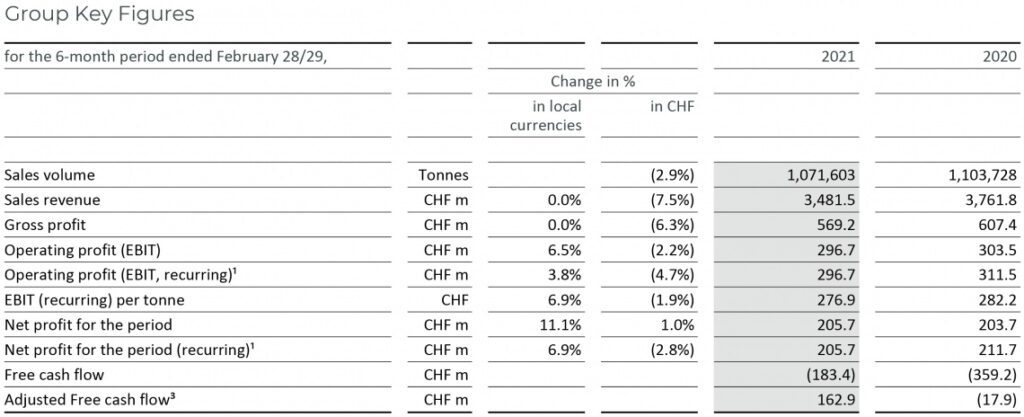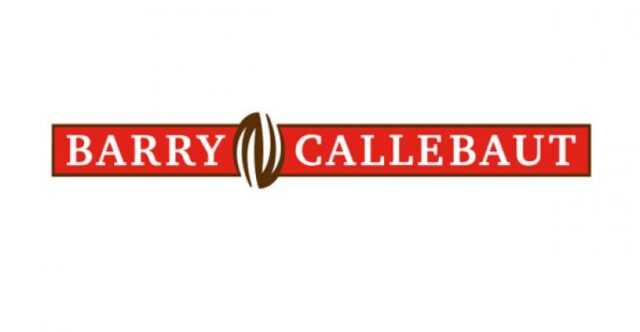ZURICH, Switzerland – The Barry Callebaut Group, the world’s leading manufacturer of high-quality chocolate and cocoa products, reported a continued recovery of its sales volume to 1,071,603 tonnes in the first six months of fiscal year 2020/21 (ended on February 28, 2021), corresponding to a decline of –2.9%. Sales volume in the chocolate business continued to improve and nearly returned to positive territory in the second quarter (–0.2%). In the period under review, this resulted in a –1.0% decline compared to a slightly positive underlying global chocolate confectionery market (+0.8%4) according to Nielsen.
The volume recovery was led by Region Asia Pacific (+6.9%) and Region Americas (+4.1%), with positive contributions from the Group’s key growth drivers Emerging Markets (+6.1%, excluding Cocoa) and Outsourcing (+1.8%).
Gourmet & Specialties volume further stabilized (–5.8%), despite a still challenging environment, with Gourmet breaking through to positive volume growth in the second quarter. Sales volume in Global Cocoa amounted to 219,153 tonnes, down by –9.6%, as a result of the continued focus on more profitable volume.
Sales revenue amounted to CHF 3,481.5 million, flat at 0.0% in local currencies (–7.5% in CHF).
Gross profit amounted to CHF 569.2 million and was stable at 0.0% in local currencies (–6.3% in CHF) compared to the first six months of prior year. The volume decline due to the COVID-19 pandemic still had a negative impact on Gross profit, but it was mitigated by a positive mix effect and the continued focus on ‘smart growth’ in the Cocoa business.
Operating profit (EBIT) amounted to CHF 296.7 million, an increase of +3.8% in local currencies
(–4.7% in CHF) compared to prior-year period EBIT recurring5. Currencies had a strong negative impact of CHF –26 million. On a reported basis, EBIT increased by +6.5% in local currencies (–2.2% in CHF). The EBIT per tonne amounted to CHF 277, up +6.9% in local currencies compared to prior-year EBIT recurring per tonne.
Net profit for the period amounted to CHF 205.7 million, up +6.9% in local currencies (–2.8% in CHF) compared to prior-year Net profit recurring5. On a reported basis, Net profit increased by +11.1% in local currencies (+1.0% in CHF). The increase was supported by lower net financing cost and lower income tax expenses.
Net working capital decreased to CHF 1,579.1 million from CHF 1,838.3 million in the prior-year period. Payables structurally improved and more than offset the increase in inventories and receivables.
Net debt decreased to CHF 1,752.9 million from CHF 1,981.0 million in the prior-year period. Considering the cocoa bean inventories as readily marketable inventories (RMI), the adjusted Net debt amounted to CHF 661.6 million compared to CHF 882.0 million in the prior-year period.
Free cash flow generation continued to strengthen in the six months under review and amounted to CHF –183.4 million compared to CHF –359.2 million in the prior-year period. Adjusted for the effect of cocoa beans considered as readily marketable inventories (RMI), the adjusted Free cash flow amounted to a strong CHF 162.9 million (February 29, 2020: CHF –17.9 million).
1 Compared to prior-year Operating profit (EBIT) recurring and Net profit recurring, which exclude the cost of CHF 8.0 million for the closure of the cocoa factory in Makassar (Indonesia).
2 On average for the 3-year period 2020/21 to 2022/23: +5-7% volume growth and EBIT above volume growth in local currencies, barring any major unforeseen events and based on the assumption of a gradual recovery from COVID-19.
3 Free cash flow adjusted for the cash flow impact of cocoa bean inventories regarded by the Group as readily marketable inventories (RMI).
4 Source: Nielsen volume growth excluding e-commerce – 25 countries, September 2020 to January/February 2021, data subject to adjustment to match Barry Callebaut’s reporting period. Nielsen data only partially reflects the out-of-home and impulse consumption, which was heavily impacted by the lockdowns due to COVID-19.
5 Prior-year Operating profit (EBIT) recurring and Net profit recurring exclude the cost of CHF 8.0 million for the closure of the cocoa factory in Makassar (Indonesia).
Outlook – Confident to deliver on mid-term guidance
 Looking ahead, CEO Antoine de Saint-Affrique said:
Looking ahead, CEO Antoine de Saint-Affrique said:
Whilst the environment remains volatile, our continued focus on customers, our drive for new opportunities and our strong innovation pipeline, together with a sound balance sheet, make us confident that we are coming out of the crisis stronger and to deliver on our mid-term guidance.
The Barry Callebaut Group: Strategic milestones in the first six months of fiscal year 2020/21
Expansion
Barry Callebaut opened its first fully segregated dairy-free production facility in Norderstedt, Germany, in February 2021. The revamped factory supplies dairy-free chocolate to the European market, tapping into the growing consumer demand for plant-based indulgence. In the same month, Barry Callebaut announced a strategic partnership with a subsidiary of Garudafood, one of the largest food and beverage companies in Indonesia. The partnership will make the compound range of the Van Houten Professional brand available to professional users in the foodservice market in Indonesia.
In March 2021, the Group announced the opening of a new chocolate factory in Baramati, India, the world’s second most populous country and one of the fastest growing chocolate confectionery markets6. The new facility includes an R&D lab and assembly lines capable of manufacturing chocolate and compound in different formats, catering to the needs of international food manufacturers, local confectioneries and semi-industrial bakers and patisseries.
Innovation
Together with start-up Bloom Biorenewables Ltd, Barry Callebaut is investigating the potential for converting the Group’s production side streams into food ingredients, including flavoring agents. The conversion of nutshells into vanillin, announced in February 2021, is one of the first successes from Barry Callebaut’s collaboration with Bloom, and a direct outcome of the Group’s involvement with MassChallenge, a global open innovation start-up accelerator.
Since its launch in 2016, Caramel Doré, the first premium Belgian caramel chocolate, continues to conquer new markets and applications. In early 2021, this resulted in the launch of “Magnum Double Gold Caramel Billionaire” across various European markets, including Switzerland.
In line with consumers’ desire to explore new exciting tastes, the first cacaofruit gelato mix was introduced by the Italian artisan ice cream supplier Rogelfrut. The new application, developed in partnership with Cabosse Naturals, celebrates the fresh fruity taste of the cacaofruit in a deliciously refreshing fruity sorbet. It will be available to artisans and gelaterias in Italy as of May 2021.
Cost Leadership
Barry Callebaut continued to drive the simplification and digitalization of its business processes, leveraging its global SAP and Salesforce platforms. In addition, the Group continued to expand the scope of services from its Shared Services Center in Lodz (Poland), which bundles Finance, IT, Procurement and HR activities. These initiatives help Barry Callebaut to improve its business relationship management with customers and suppliers, to control its costs and to maintain business continuity.
Sustainability
Barry Callebaut is committed to nurturing an inclusive environment where everyone is given the opportunity to learn, grow and fulfill their potential. On this basis Barry Callebaut launched in January 2021 ‘#oneBC’, its Diversity & Inclusion strategy. It sets ambitious, measurable targets for the Group to improve its gender balance and cultural diversity at senior management level by 2025.
For the second consecutive year, Barry Callebaut was recognized in February 2021 by CDP as a Supplier Engagement Leader, placing the company in the top 7% of the over 5,600 companies assessed in 2020. CDP is an independent organization which assesses annually industries’ carbon reduction plans as well as companies’ supply chain engagement on climate issues. As part of its Forever Chocolate target to be carbon positive by 2025, Barry Callebaut committed to reducing the carbon impact of its entire supply chain (Scope 1, 2 and 3), which includes the production and processing of all the raw materials that Barry Callebaut sources, and related land use changes.
Barry Callebaut announced in March 2021 the cooperation between Cocoa Horizons and Seekewa, an award-winning start-up from Côte d’Ivoire, on a pilot project to increase and diversify the income of cocoa farmers in the Cocoa Horizons program. Income diversification is a key element of Barry Callebaut’s strategy for lifting cocoa farmers out of poverty. The collaboration with Seekewa is another direct outcome of the Group’s involvement with the start-up accelerator MassChallenge.
6 The sales volume of chocolate confectionery in India grew at a CAGR of +9% between 2014-2019, according to Nielsen.


















